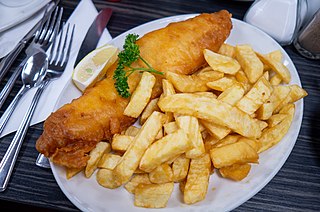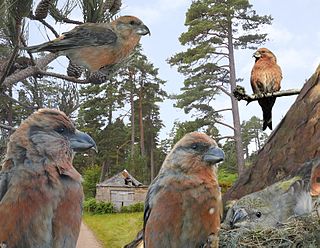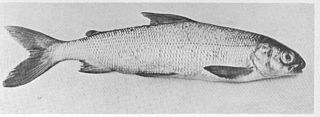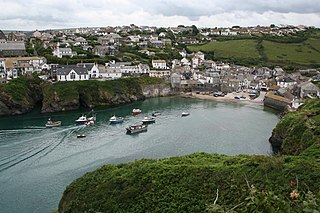
Fish and chips is a hot dish consisting of fried fish in batter, served with chips. The dish originated in England, where these two components had been introduced from separate immigrant cultures; it is not known who combined them. Often considered Britain's national dish, fish and chips is a common takeaway food in numerous other countries, particularly English-speaking and Commonwealth nations.

Derek William Dick, better known by his stage name Fish, is a Scottish singer, songwriter and occasional actor. He was the lead singer and lyricist of the neo-prog band Marillion from 1981 until 1988. He released 11 UK Top 40 singles with the band, including the Top Ten singles "Kayleigh", "Lavender" and "Incommunicado", and five Top Ten albums, including a number one with Misplaced Childhood. In his solo career, Fish explored contemporary pop and traditional folk, and released a further five Top 40 singles and a Top 10 album.

The haddock is a saltwater ray-finned fish from the family Gadidae, the true cods. It is the only species in the monotypic genus Melanogrammus. It is found in the North Atlantic Ocean and associated seas, where it is an important species for fisheries, especially in northern Europe, where it is marketed fresh, frozen and smoked; smoked varieties include the Finnan haddie and the Arbroath smokie. Other smoked versions include long boneless, the fileted side of larger haddock smoked in oak chips with the skin left on the fillet.

A fish ladder, also known as a fishway, fish pass, fish steps, or fish cannon, is a structure on or around artificial and natural barriers to facilitate diadromous fishes' natural migration as well as movements of potamodromous species. Most fishways enable fish to pass around the barriers by swimming and leaping up a series of relatively low steps into the waters on the other side. The velocity of water falling over the steps has to be great enough to attract the fish to the ladder, but it cannot be so great that it washes fish back downstream or exhausts them to the point of inability to continue their journey upriver.

The Scottish crossbill is a small passerine bird in the finch family Fringillidae. It is endemic to the Caledonian Forests of Scotland, and is the only terrestrial vertebrate species endemic to the United Kingdom. The Scottish crossbill was confirmed as a unique species in August 2006, on the basis of having a distinctive bird song.

The brown trout is a species of salmonid ray-finned fish and the most widely distributed species of the genus Salmo, endemic to most of Europe, West Asia and parts of North Africa, and has been widely introduced globally as a game fish, even becoming one of the world's worst invasive species outside of its native range.

Kedgeree is a dish consisting of cooked, flaked fish, boiled rice, parsley, hard-boiled eggs, curry powder, lemon juice, salt, butter or cream, and occasionally sultanas.

Esox is a genus of freshwater fish commonly known as pike or pickerel. It is the type genus of the family Esocidae. The type species of the genus is Esox lucius, the northern pike.

The powan is a kind of freshwater whitefish endemic to two lochs in Scotland, Loch Lomond and Loch Eck. It has been successfully introduced in two other sites, Loch Sloy and the Carron Valley Reservoir.

A fish and chip shop, sometimes referred to as a chip shop or chippy, is a restaurant that specialises in selling fish and chips. Usually, fish and chip shops provide takeaway service, although some have seating facilities. Fish and chip shops may also sell other foods, including variations on their core offering such as battered sausage and burgers, to regional cuisine such as Indian food.
"The Laily Worm and the Machrel of the Sea" is an English-language folk song. 'Machrel' is an archaic spelling of 'mackerel', the type of fish, and title can be spelled either way.

The fishing industry in Scotland comprises a significant proportion of the United Kingdom fishing industry. A recent inquiry by the Royal Society of Edinburgh found fishing to be of much greater social, economic and cultural importance to Scotland than it is relative to the rest of the UK. Scotland has just 8.4 per cent of the UK population but lands at its ports over 60 per cent of the total catch in the UK.
Styracopterus is an extinct genus of prehistoric bony fish that lived during the Tournaisian stage of the Mississippian epoch of Scotland and Eastern European Platform, Russia.
Cosmoptychius is an extinct genus of freshwater and estuarine ray-finned fish that lived during the Mississippian epoch. It contains a single species, C. striatus from the Visean of Scotland. It has a wide stratigraphic range in the Wardie Shale, with many specimens known.

Aetheretmon is an extinct genus of prehistoric freshwater and estuarine ray-finned fish that lived during the early Mississippian (Dinantian) age in what is now Europe, including Scotland, Belarus, and Russia. It contains only the species A. valentiacum. This genus has the oldest known actinopterygian growth series, indicating that juvenile Aetheretmon had tails similar to those of modern teleosts, but unlike teleosts, their upper tails continued to grow throughout their lives instead of truncating early. Initially classified as a "palaeoniscid", later studies have recovered it as a stem-neopterygian, or more recently a stem-actinopteran.
Strepheoschema is an extinct genus of prehistoric bony fish that lived during the early Mississippian (Tournaisian–Visean) in what is now Berwickshire, Scotland, and Northumberland, England. Fossils were recovered from the Ballagan Formation.

Phanerosteon is an extinct genus of prehistoric bony fish from the Carboniferous period. The type species, P. mirabile, was recovered from the Calciferous sandstone series (Pennsylvanian), Scotland. A second species, P. phonax was described from the Serpukhovian aged Bear Gulch Limestone lagerstätte in Montana, United States.

The fishing industry in England comprises a significant proportion of the UK's fishing industry. England retains a large but reduced fishing industry. Its fleets bring home fish of every kind, ranging from sole to herring.

Cod and other cod-like fish have been widely used as food through history. Other cod-like fish come from the same family (Gadidae) that cod belong to, such as haddock, pollock, and whiting.

Salvelinus killinensis, also known as Haddy charr is a variety of charr found in certain lakes in Scotland.

















